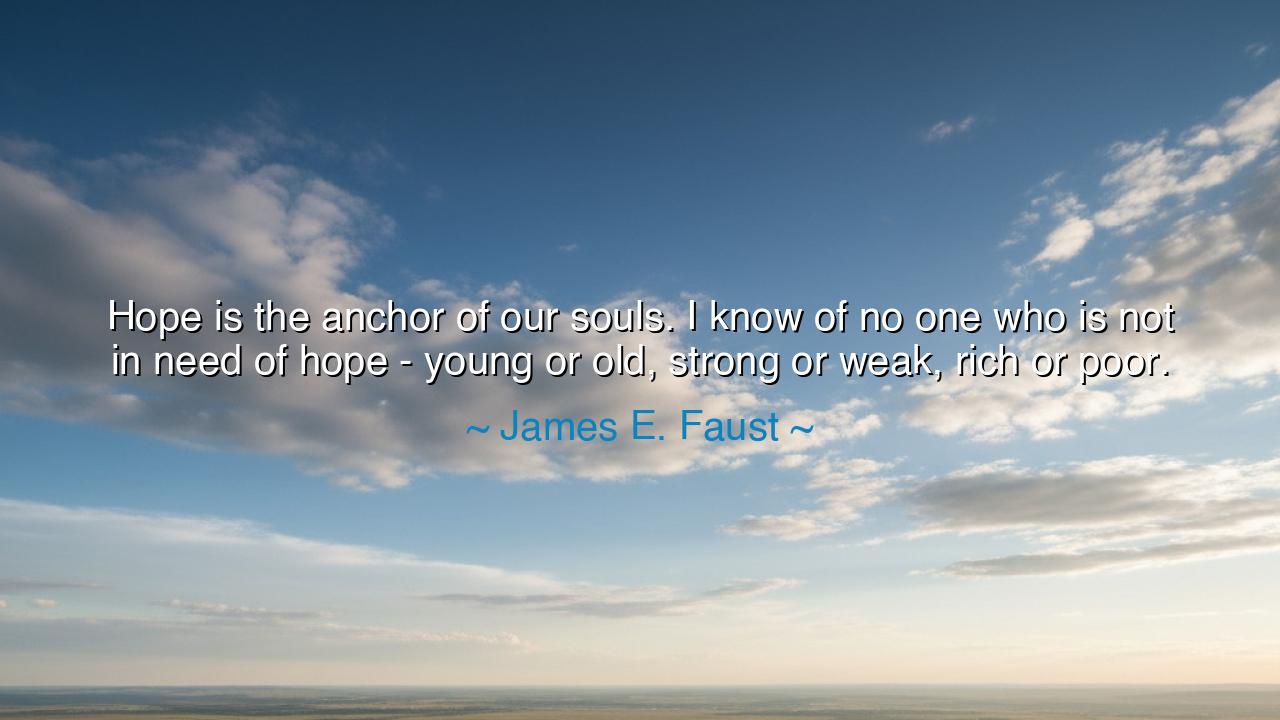
Hope is the anchor of our souls. I know of no one who is not in
Hope is the anchor of our souls. I know of no one who is not in need of hope - young or old, strong or weak, rich or poor.






“Hope is the anchor of our souls. I know of no one who is not in need of hope — young or old, strong or weak, rich or poor.” — James E. Faust
In this tender and radiant declaration, James E. Faust, a leader of deep faith and wisdom, speaks to one of the oldest truths of humankind: that hope is the light that steadies the heart in the storm of life. When he says, “Hope is the anchor of our souls,” he calls upon an image as ancient as the sea itself — the anchor, that steadfast symbol of safety and endurance. Just as a ship tossed by wind and wave can only survive by holding fast to its anchor, so too can the human spirit endure the tempests of sorrow, loss, and uncertainty only through hope. It is the quiet strength that keeps us from drifting into despair, the invisible chain that ties us to meaning when everything else seems lost.
The origin of this imagery reaches far beyond Faust himself, echoing words found in the ancient scriptures of the Christian New Testament, in the Epistle to the Hebrews: “We have this hope as an anchor for the soul, firm and secure.” Through centuries, the anchor has stood as a sign of faith in unseen things — in the goodness that endures beyond suffering, in the dawn that follows the longest night. Faust, speaking to a world wearied by modern anxieties and spiritual hunger, revived this ancient metaphor to remind his listeners that every person, no matter how powerful or humble, needs something to hold onto — something that transcends circumstance.
For even the mighty grow weary, and even the wise lose their way. Faust’s words, “I know of no one who is not in need of hope,” are not poetic exaggeration but profound realism. The young need hope to believe their lives will matter. The old need it to find peace in their memories and courage for their final days. The strong need it when their strength fails, and the rich need it when wealth proves powerless against grief. Hope is not a luxury — it is the breath of the soul. It sustains kings and beggars alike, reminding them that beyond the present struggle lies something sacred, something worth enduring for.
History is filled with stories that reveal the power of this anchor. Consider the life of Viktor Frankl, the Jewish psychiatrist imprisoned in the Nazi concentration camps. Amidst starvation and death, he found that those who survived longest were not the strongest of body, but those who possessed hope — the belief that life still had meaning, that suffering could be transformed into purpose. Frankl himself wrote that “everything can be taken from a man but one thing — the last of human freedoms — to choose one’s attitude in any given set of circumstances.” It was hope, the anchor of his soul, that kept him from being swept away by despair.
In this, Faust’s wisdom aligns with the teachings of all great spiritual traditions. The Stoics spoke of endurance; the Buddhists of mindful persistence; the prophets of faith in a world redeemed. Each speaks of hope under another name. But Faust’s phrasing, rich and direct, strikes the human heart with clarity: life’s storms are inevitable, but we are not without anchor. The question is not whether we will face hardship, but whether we will remember what holds us steady when it comes. Without hope, even the calmest sea can destroy us. With it, even the fiercest storm becomes bearable.
Yet we must understand that hope is not passive. It is not the mere wish that things will turn out well; it is the courage to continue acting when we cannot see the outcome. It demands faith — in God, in others, or in the quiet resilience of the human spirit. To hold to hope is to say, “I will not let despair define me.” The anchor holds not because the storm ceases, but because we choose not to cut the rope. Every day we live, we must renew that choice — to hold fast, to believe that our striving still matters, and that beyond the horizon lies calm waters once more.
Lesson:
From James E. Faust’s words, let us take this truth: hope is not a decoration of the soul, but its foundation. No one, however mighty or wise, outgrows their need for it. When you feel yourself adrift, cast your anchor deep — in faith, in love, in the quiet knowledge that life has meaning even in its trials. Nurture hope not by waiting, but by working — by serving others, by seeking light, by trusting that no storm lasts forever. And when others around you are sinking, lend them your own anchor, your own words of faith. For to share hope is to strengthen it, and to live in hope is to make your life — and the world — a little more unshakable beneath the heavens.






AAdministratorAdministrator
Welcome, honored guests. Please leave a comment, we will respond soon